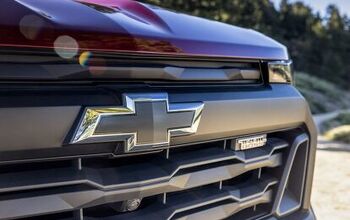BREAKING: Toyota To Recall 270k 2010 Priuses, Similar Problems Reported On Ford Hybrids [Updated With Ford Press Release]
According to MSNBC, Toyota’s US-based spokesfolks are refusing to confirm a Nikkei report that Toyota has issued a recall of 270,000 2010 model-year Priuses for brake issues the company has already acknowledged. “We have no information on any decision to recall the Prius,” said Toyota Motor Sales USA spokesman John Hanson, who said the company is working with the NHTSA on a “preliminary evaluation” of the problem. According to another report, the recall (which will be filed “shortly”) involves 100k Priuses in the US market, with the remaining 176k in Japan.
While Toyota may or may not recall the Prius, Ford is not recalling its Fusion and Mercury Milan Hybrids for what appears to be a similar issue (poor transitions between regenerative and conventional brakes). Instead, Ford is instituting a “Customer Satisfaction Program” involving free software upgrades it says will fix the problem, which was first reported by Consumer Reports.
UPDATE: Ford responds with a press release after the jump.
UPDATE 2: While we sort some of these late-breaking developments out, here’s another spurious log for the fire: ABC News impugns “federal investigations were extremely limited in scope, after negotiations involving former safety investigators who had been recruited to work for Toyota’s Washington, D.C. office.”
UPDATE 3: Oy!
FORD CUSTOMER SATISFACTION PROGRAM
Ford is proactively announcing a customer satisfaction program to update the software of the regenerative brake system of some 2010-model Ford Fusion Hybrids and Mercury Milan Hybrids.
Dearborn, Mich., Feb. 4, 2010 – Today, we are announcing a customer satisfaction program to update the software of the regenerative brake system of some 2010-model Ford Fusion Hybrids and Mercury Milan Hybrids.
We have received reports that some drivers have experienced a different brake feel when the hybrid’s unique regenerative brakes switch to conventional hydraulic braking. While the vehicles maintain full braking capability, customers may initially perceive the condition as loss of brakes.
To be clear, the Fusion and Milan Hybrids’ brake system maintains full conventional brakes and full ABS function even as the customer sees visual indicators and hears a chime. The software threshold to transition from regenerative brakes to conventional brakes can cause the system to transition to conventional brakes unnecessarily.
The software upgrade will reduce unnecessary occurrences of the vehicle switching from regenerative braking to conventional hydraulic brakes.
Customers with affected vehicles will receive a notice in the mail. We are asking owners of affected vehicles to have vehicle software reprogrammed at dealers at no charge.
There have been no injuries related to this condition.
More by Edward Niedermeyer
Latest Car Reviews
Read moreLatest Product Reviews
Read moreRecent Comments
- Lou_BC Hard pass
- TheEndlessEnigma These cars were bought and hooned. This is a bomb waiting to go off in an owner's driveway.
- Kwik_Shift_Pro4X Thankfully I don't have to deal with GDI issues in my Frontier. These cleaners should do well for me if I win.
- Theflyersfan Serious answer time...Honda used to stand for excellence in auto engineering. Their first main claim to fame was the CVCC (we don't need a catalytic converter!) engine and it sent from there. Their suspensions, their VTEC engines, slick manual transmissions, even a stowing minivan seat, all theirs. But I think they've been coasting a bit lately. Yes, the Civic Type-R has a powerful small engine, but the Honda of old would have found a way to get more revs out of it and make it feel like an i-VTEC engine of old instead of any old turbo engine that can be found in a multitude of performance small cars. Their 1.5L turbo-4...well...have they ever figured out the oil dilution problems? Very un-Honda-like. Paint issues that still linger. Cheaper feeling interior trim. All things that fly in the face of what Honda once was. The only thing that they seem to have kept have been the sales staff that treat you with utter contempt for daring to walk into their inner sanctum and wanting a deal on something that isn't a bare-bones CR-V. So Honda, beat the rest of your Japanese and Korean rivals, and plug-in hybridize everything. If you want a relatively (in an engineering way) easy way to get ahead of the curve, raise the CAFE score, and have a major point to advertise, and be able to sell to those who can't plug in easily, sell them on something that will get, for example, 35% better mileage, plug in when you get a chance, and drives like a Honda. Bring back some of the engineering skills that Honda once stood for. And then start introducing a portfolio of EVs once people are more comfortable with the idea of plugging in. People seeing that they can easily use an EV for their daily errands with the gas engine never starting will eventually sell them on a future EV because that range anxiety will be lessened. The all EV leap is still a bridge too far, especially as recent sales numbers have shown. Baby steps. That's how you win people over.
- Theflyersfan If this saves (or delays) an expensive carbon brushing off of the valves down the road, I'll take a case. I understand that can be a very expensive bit of scheduled maintenance.

































Comments
Join the conversation
What is it with the GM troll hanging around here these days?
Most computer software undergoes some form of beta testing - putting the 'finished' product in the hands of enough knowledgeable users to get real world bug reports so the code can be fine tuned. As cars become more software dependent, the car companies are going to have to develop some kind of beta testing. Preproduction and pilot production cars are just not made in sufficient quantities to get adequate test samples on the software.